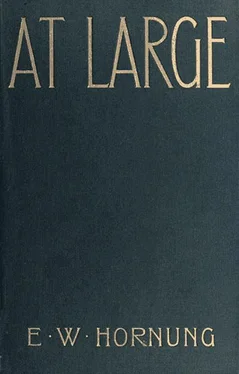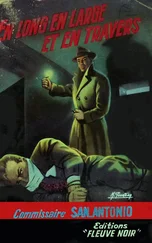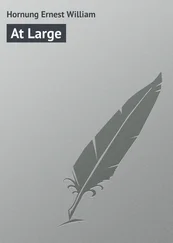E Hornung - At Large
Здесь есть возможность читать онлайн «E Hornung - At Large» весь текст электронной книги совершенно бесплатно (целиком полную версию без сокращений). В некоторых случаях можно слушать аудио, скачать через торрент в формате fb2 и присутствует краткое содержание. Жанр: Старинная литература, на английском языке. Описание произведения, (предисловие) а так же отзывы посетителей доступны на портале библиотеки ЛибКат.
- Название:At Large
- Автор:
- Жанр:
- Год:неизвестен
- ISBN:нет данных
- Рейтинг книги:3 / 5. Голосов: 1
-
Избранное:Добавить в избранное
- Отзывы:
-
Ваша оценка:
- 60
- 1
- 2
- 3
- 4
- 5
At Large: краткое содержание, описание и аннотация
Предлагаем к чтению аннотацию, описание, краткое содержание или предисловие (зависит от того, что написал сам автор книги «At Large»). Если вы не нашли необходимую информацию о книге — напишите в комментариях, мы постараемся отыскать её.
At Large — читать онлайн бесплатно полную книгу (весь текст) целиком
Ниже представлен текст книги, разбитый по страницам. Система сохранения места последней прочитанной страницы, позволяет с удобством читать онлайн бесплатно книгу «At Large», без необходимости каждый раз заново искать на чём Вы остановились. Поставьте закладку, и сможете в любой момент перейти на страницу, на которой закончили чтение.
Интервал:
Закладка:
"They are so free-and-easy out there; they despise conventionality; they are natural. Oh that we were all Australians!" (Mr. Miles was the one Australian of her acquaintance.)
Thus when he swore unmistakably at a clumsy oarsman while piloting the ladies through a crowded lock, the offence was hushed up with a formula; and so were other offences, since formulas will cover anything.
One day Mrs. Parish, going into the drawing-room, paused on the threshold with an angry sniff.
"Smoke—in here! It is the very first time in all these years," severely to Alice, "that I have ever known your papa—"
"It was not papa, it was Mr. Miles," said Alice quietly. "He walked in with his pipe, and I really did not like to tell him. I believe he has gone for more tobacco."
"Why, how stupid of me! Of course, with Mr. Miles it is quite different." (Mrs. Parish assumed an indulgent tone.) "He is not used to such restraints. You were quite right to say nothing about it. He shall smoke where he likes."
Again the little old lady came to Alice, and said very gravely:
"My dear, did you notice the way our visitor refused the hock this evening? Of course they do not drink such stuff in the bush, and he must have what he is accustomed to. I will arrange with Tomlin to have the whisky decanter placed quietly in front of him for the future."
Alice, for her part, not only permitted but abetted this system of indulgence; for she agreed with Mrs. Parish that the guest was a noble creature, for whose personal comfort it was impossible to show too much solicitude—which, indeed, was the least they could do. He had saved her father's life.
That incident—which she had related to Dick with a wonderful absence of feminine exaggeration—had been in itself enough to plant in her heart a very real regard for Mr. Miles. That was but natural; but one or two other things which came to her knowledge furthered this regard.
One Saturday morning in Kingston market-place Alice met a bosom friend, who informed her that she had seen the Graysbrooke pleasure-boat being towed up-stream by a tall gentleman—("So handsome, my dear; who is he?")—while a miserable, half-starved wretch sat luxuriously in the stern-sheets. Rallied with this, the Australian's brick-dust complexion became a shade deeper. Then he made a clean breast of the affair, in his usual quiet tone, but with a nearer approach to diffidence than he had yet shown them. He had gone out for a solitary pull, and had no sooner started than a cadaverous creature with a tow-rope pestered him for a job. Miles had refused the man; doubted his strength to tow a flea with a silk thread; and observed that he, Miles, was more fit to tow the other, if it came to that. At this, Miles, being sworn at for making game of a starving man, had promptly landed, forced the man, speechless with amazement, into the boat, towed him to Kingston, and left him to a good dinner, with some wholesome advice touching immediate emigration.
A few days later, at dusk on a wet afternoon, Mrs. Parish, from her bedroom window, saw Mr. Miles walk quickly up the drive in his shirt-sleeves. It transpired that he had given his coat to a ragged, shivering tramp on the London road—plus the address of the Emigration Office.
"You see," he said, on both these occasions, "I never saw anything half so bad in my own country. If you aren't used to it, it knocks a man's heart to see a poor devil so far gone as all that."
In short, Mr. Miles exhibited to the Bristos, on several occasions, a propensity to odd and impulsive generosity; and the point told considerably in their general regard for the man, which day by day grew more profound.
Among other peculiarities, so excellently appreciated, Mr. Miles had a singular manner of speaking. It was an eminently calm manner; but for the ring of quiet audacity in every tone, it might have been called a subdued manner. He never raised his voice; he never spoke with heat. When he said to Colonel Bristo, clinging to him in the sea, "If you hang on like that I must fell you," his tone was as smooth as when he afterwards apologised for the threat. When he paid Alice his first compliment he did so without the smallest hesitation, and in his ordinary tone; and his compliments were of the most direct order. They once heard him threaten to thrash a bargee for ill-treating a horse, and they were amazed when the man sulkily desisted; the threat was so gently and dispassionately uttered. As for his adventures, they were told with so much of detail and gravity that the manner carried conviction where the matter was most fantastic. Miles was the best of "good company." Apart from the supreme service rendered to him, Colonel Bristo was fully persuaded that he was entertaining the best fellow in the world. Add to this that Mrs. Parish adored the handsome Australian, while Alice meekly revered him, and it will be easily seen that a hostile opinion of their hero was well calculated to recoil on its advocate.
During the short period in which the hero was also the stranger, he spent all his time in the Colonel's society. Apparently the two men found many subjects of mutual interest. Once, when Alice interrupted them in the study, Mr. Miles seemed to be eloquently enumerating the resources and capabilities of some remote district of the Antipodes; for though she spent some minutes getting a book, he took no notice of her presence in the room. On another occasion Alice saw her father examining a kind of map or plan, while Mr. Miles bent over him in explanation. She afterwards learnt that this was a plan of the Queensland station of which Mr. Miles was part owner.
After the first day or two it seemed evident that Mr. Miles disliked the society of ladies.
On the third evening, however, the men patronised the drawing-room for half-an-hour, and the Colonel asked Alice to sing something. She sang, and Mr. Miles listened. When she had finished, Mr. Miles coolly asked her to sing again. The following night he extracted three songs from her. Then Mr. Miles began to spend less time in his host's sanctum. He cultivated Alice; he interested himself in her amusements—photography for one; he got her to sing to him in the daytime. He was civil to Mrs. Parish.
When the young lady sat down to the piano, this sun-burned Apollo did not hang over her, as other men did (when they got the chance); nor did he turn over a bar too soon or too late—like the others. He made no pretence of polite assistance, not he. But he flung himself in a chair, threw back his head, and drank in every note. At first it was generally with his back to the piano, and always with closed eyes. Then he found another chair—one a little further away, but so placed that the girl's profile was stamped like a silhouette on the sunlit window, directly in his line of vision. And he no longer listened with closed eyelids.
Mrs. Parish, a keen observer, hovered about during these performances, and noted these things. She had perceived at the time the impression Alice's first song made upon Mr. Miles: she saw that he had regarded the girl from that moment with a newly awakened interest. Thenceforth he had made himself agreeable to both ladies, whereas before he had ignored them both. Now, although she knew well enough that Miles's attentions, so far as she was concerned, could be but politic, yet such was the inveterate vanity of this elderly duenna that she derived therefrom no small personal gratification. An impudent compliment thrilled her as it might have thrilled a schoolgirl. But this did not prevent her seeing what was really going on, nor secretly rejoicing at what she saw.
She watched the pair together from the first. She watched the girl innocently betray her veneration for the man who had saved her father's life. She knew that it is perilous for a man to see that a girl thinks him a hero, and she awaited results. She soon fancied that she saw some. She thought that Miles's habitual insouciance was a trifle less apparent when he conversed with Alice; certainly his eyes began to follow her and rest upon her; for Mr. Miles did such things openly. But she detected no corresponding symptoms in Alice; so one day she told her bluntly: "Mr. Miles is falling in love with you, child."
Читать дальшеИнтервал:
Закладка:
Похожие книги на «At Large»
Представляем Вашему вниманию похожие книги на «At Large» списком для выбора. Мы отобрали схожую по названию и смыслу литературу в надежде предоставить читателям больше вариантов отыскать новые, интересные, ещё непрочитанные произведения.
Обсуждение, отзывы о книге «At Large» и просто собственные мнения читателей. Оставьте ваши комментарии, напишите, что Вы думаете о произведении, его смысле или главных героях. Укажите что конкретно понравилось, а что нет, и почему Вы так считаете.











